高级英语 Unit Hit the Nail on the Head PPT
Hit the Nail on the Head 新编英语五第一课
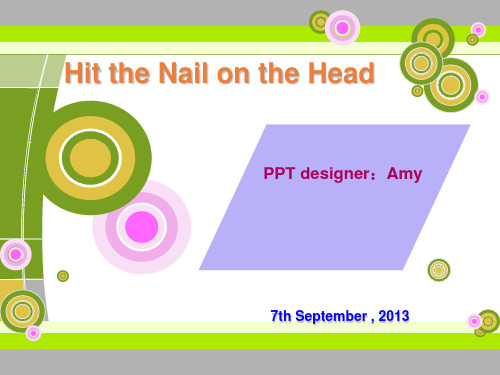
LOGO
The Article Arguement
1,Importance of choosing the right word 2、Explaining the various aspects in the profile of a word 3、Conclusion: Quality is more important than quantity in learning vocabulary (with an analogy to echo the beginning)
LOGO
What is the difference between analogy and comparison?
Comparison - similarities & differences - two things with similar qualities - two things familiar to the audience
Section7
The importance of a good control and command over known words .
LOGO
Hit the Nail on the Head
Writing Styles
Quotation
Anology
Clumsy man
skilful carpenter
LOGO
Writing Skills Analogy
So with language…his point firmly and exactly.(para1.line4)
We don’t have to look…carpentry in language.(para5,line1) It is perhaps easier…than a good craftsman with words.(para9) A good carpenter is not distinguished…so a good writer is not measured by…cleanly on the head. (last sentence) good or bad carpenter strike a nail use words
Unit1hit-the-nail-on-the-head恰到好处

乌干达一政党领袖给新闻界的一封信中有一句这样写道:
Let us all fight this selfishness,opportunism, cowardice and ignorance now rife in Uganda and put in their place truth, manliness, consistency andsingularityof mind.
一些英语词汇词根相同而意义却截然不同。例如human 和humane,二者的词根相同,词义也相关,但用法完全不同。“ human action (人类行为)”和“humane action ( 人道行为)”完全是两码事。我们不能说“人道权力宣言”,而是说“人权宣言”。有一种屠杀工具叫“humane killer ( 麻醉屠宰机),而不是human killer ( 杀人机器)。
The French have an apt(贴切的)phrase for this.They speak of“le mot juste,”(the exact word) the word that is just right.Stories are told ofscrupulous(一丝不苟的)writers, like Flaubert, who spent days trying to get one or two sentences exactly right.Words are many and various; they are subtle(微妙的)and delicate(细腻的)intheirdifferent shades(色调)of meaning, and it is not easy to find the ones that express precisely(正是,恰恰)what we want to say.It is not only a matter of having a good command oflanguageand a fairly wide vocabulary; it is also necessary to think hard and to observe accurately.Choosing words is part of the process of realization, of defining our thoughts and feelings for ourselves, as well as for those who hear or read our words.Someone once remarked:“How canIknow whatIthink tillIsee whatIsay?”this soundsstupid, but there is a great deal of truth in it.
Unit 1-Hit the nail on the head
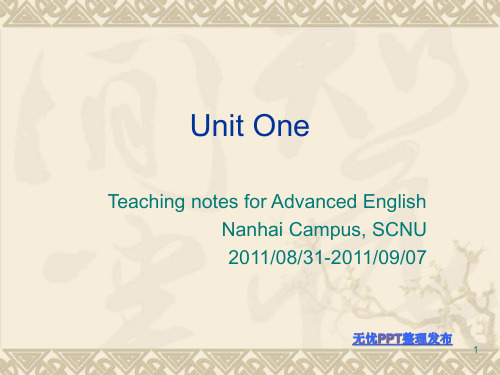
2.
3.
4.
Learn how to do Text Analysis Understanding the various aspects related to the usage of words. Cultivating a sense of appropriateness in style Learning to use analogy as an expository means.
பைடு நூலகம்
6
Whose
job involves hitting nails? Is the text concerned about the carpenter? Then, what‘s the major concern of the author? ( stylistic matter, how to use the right word from the extensive vocabulary of the English language)
9
III. Organization of the text
Section
1 Introduction Section 2 Body Section 3 Conclusion
10
Section I (paragraph 1-3) :
Raising the subject: Importance of choosing the right words. 1. Para 1 2. Para 2-3
Att: Word choice appreciation: e.g. ? For Ss.
20
Use of an expository means/writing technique: (Reference reading P. 7) Qs: 1. How does the author introduce the subject? 2. WHAT is the purpose of drawing an analogy? 3. WHEN is it often used? 4. HOW is it different from ―comparison‖?
1. Hit the Nail on the Head PPT课件

By Alan Warner
恰到好处
作者:艾伦.沃纳
第一段
①Have you ever watched a clumsy man hammering a nail into a box? ②He hits it first to one side, then to another, perhaps knocking it over completely, so that in the end he only get half of it into the wood. ③A skilful carpenter, on the other hand, will drive home the nail with a few firm, deft blows, hitting it each time squarely on the head. [续]
④例如,可能有人问过你:“某某人怎样?” ⑤ 你回答说:“嗯,我认为他是个不错的家伙,但 他非常…”然后你停了下来,因为你要努力找一个 词或短语来说明他哪里让你讨厌,有什么不足。 ⑥当你找到恰当短语时,你会感觉自己对他的看 法更清楚,也更精确了。
第四段
①Some English words have a common root but are used in very different senses. ②Consider human and humane, for example. [续]
①这个呼吁非常激动人心,但是被最后一个短 语中的singularity这个近音误用错误给破坏了。②我认 为,作者真正想表达的意思是思想上的singleness,即 执著于心中的目标,而不被次要的目的干扰。③ singularity指的是oddity 或 peculiarity,是指将一个人从 众多人中区分出来的某种特质。
hit the nail on the head
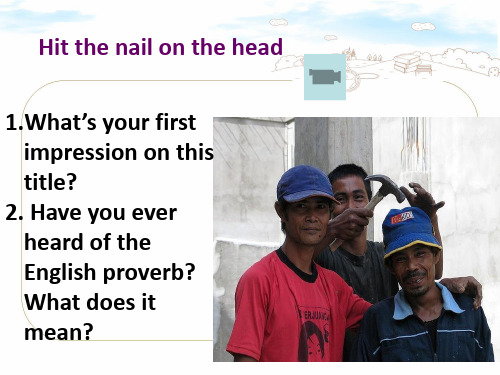
Clumsy carpenter (get half of the nail into the wood)
Good craftsman Bad craftsman Skillful carpenter (choose words that will (more or less right, (hit the nail squarely drive home his point loose phrases, on the head) firmly and exactly) ambiguous expressions)
Para2,L1
Question: What does the word “this” in Sentence one refer to?
Answer:Getting the word that is completely right for the writer’s purpose.
The discrimination of words meanings 词 义辨析
Parrely on the head:hitting it directly on the head; (informal) be exactly right in words or action E.g.Your criticism really hit the nail on the head.
paragraph 9 :Wrong choice of words caused by failure to recognize their connotations (隐含意义) Examples: imprison, contain, sum up, epitomize [ɪ'pɪtəmaɪz] and distill paragraph 10 :Stylistic differences between synonyms Examples: in my childhood vs. when I was a child; love to watch vs. Love watching die vs. expire; poor vs. in indigent circumstances
hit the nail on the head

Unit One: Hit the Nail on the HeadObjective:1.To instruct how to draw an analogy2.To arouse students’ interest in apt diction.3.To impart the knowledge of outlining a passage4.To teach the usage of some words and expressionsKey Points: Outlining the text, appreciation of the difference in meaning, drawing an analogy Difficult Points: Outlining, Appreciation of the difference in meaning, Drawing an analogy Approach: Task-based and communicative approachesDuration: Seven PeriodsContent:●.Lead-in questions:▼Question 1: Ask students to describe their summer holiday▼Question 2: Ask some to describe their partners▼Comments: usher in the topic of describing with apt words.▼Have you ever heard of the English proverb “Hit the nail on the head”? What does it mean?Literally:Strike the nail in a skillful way so that it could be knocked into the wood. Figuratively:It means being exactly right in words or action.(Comment on the students’ answer: hit the nail on the head, hit it to one side)Eg. You really hit the nail on the head with your description.Professor Li hit the nail on the head in his speech on the demerits of the existing housing policy.●. Scan for the main ideas and outline of the textPart One: Paragraph 1Part Two: Paragraph 2-11Section 1 (para. 2-3) : the significance of finding the right wordsSection 2 (para. 4-7): semantic differences between words having the same rootSection 3 (Para.8): wrong choice of words caused by failure to recognize their connotationsSection 4 (para. 9) stylistic differences between synonymsSection 5 (para. 10) the abundance of specific words in English for general notions.Section 6 (para 11) encouragement●Text Discussion▼Discussion about Paragraph One:▽Question:Who often uses nails? (carpenters) And who often uses words? ( people,esp. writers). Can you find a general word in paragraph one which can be used to refer to both carpenters and writers? (craftsman: a person skilled in a job or a trade)▽Question: Then is this essay mainly about how carpenters hammer nails or about how writers employ words? (The author advises that the English students should try to get the words, phrases and sentences completely right for their purposes in their writing.). How does the author shift the topic from carpentry to language?▽Question: In Paragraph one, the author really touches upon carpentry or the skill of a carpenter; then why does the author touch upon carpentry but focus on the writers’skill of choosing words? What is the use of the description of how a carpenter knocks a nail into the wood? (The author uses something we are familiar with to explain something that we are unfamiliar with. -----analogy) (by analogy, draw an analogy)★Analogy: analogy is a method often used in exposition and description by which an unfamiliar object or idea is explained or described by comparing it with more familiar objects or ideas.Eg: To liken the complicated and less tangible process of learning a foreign language to the more familiar and visible process of building a house is a very popular analogy. V ocabulary: bricks. Grammar: principles of bricklaying, etc)▽Question: Then do you know why he author uses “ hit the nail on the head” as the title? Is this title good? Why or why not?It is good, for it both touches upon the skill of hammering a nail (related to carpentry) and the skills of choosing proper words. It provides a bridge or a common point for them.▽Question: Analyze the development of the first paragraphContrast: Clumsy carpenter Vs Skillful CarpenterAnalogy: Carpenter Vs Writer▽Language Points: Deft/ drive something home/ ambiguous (ambi-)▼Discussion about Paragraph Two:▽Question: How is the second paragraph related to the first one?▽Question: What do you know about Gustave Flaubert? Try to offer some information about this writer.★Gustave Flaubert (1821-1880), French novelist, was associated with, thought not representative of, the movement of naturalism and known as one of thegreatest realists of nineteenth-century France. He devoted his life to longhours spent in heavy toil over his work. His writing is marked byexactness and accuracy of observation, extreme impersonality andobjectivity of treatment, and precision and expressiveness in style, or theprinciple of the mot juste.▽Language Points: Apt/ scrupulous/ subtle/ delicate▼Discussion about Paragraph Three:▽Question. How is the third paragraph related to the second one? What can we learn from this?▽Question: Analyze paragraph three. What are the relationships between different sentences? In other words, how does the author develop his ideas?▽Language Points: limit VS limitation/ conception VS concept /-ceive→-ception▼Discussion about Paragraph Four▽Question: What is the function of the first sentence in this paragraph?▽Question: After you read the paragraph, can you try to distinguish the word “human” from “human e”? Try.▽Question: What does the phrase “for example” strike you?▽Question: What do you know about the Declaration of Human Rights?▽Language Points: human VS humane, distinct VS distinctive▼Discussion about Paragraph Five▽Question: What are key words in this paragraph?▽Question: What is the function of the first sentence in this paragraph?▽Question: What are the differences between “anxiety” and “eagerness”?▽Language Points: look afield / anxiety VS eagerness/ have some kinship with▼Discussion about Paragraph Six▽Question: What is the relationship between this paragraph and paragraph five? How is this paragraph related to the previous one?▽Question: For what purpose does the author write this paragraph?▽Question: What do you know about Uganda? Try to search for some information about this country.▽Language Points: opportunism/ cowardice/ rife in/ n.+ly/ singularity▼Discussion about Paragraph Seven▽Question: What is the relationship between paragraph seven and paragraph six? Is the relationship of this kind similar to the relationship between paragraph six and paragraph five? Support your idea.▽Question: What do you know about Mrs. Malaprop and Malapropism?★Mrs. Malaprop is a famous character in Sheridan’s comedy The Rivals. She is noted for her blunders in the use of words. “As head strong as an allegory (alligator) on the banks of the Nile” is one of her grotesque misapplications. She also requests that no delusions (allusions) to the past to be made. She has given us the word malapropism as a name for such mistakes.▼Discussion about Paragraph Eight▽Question: What is the function of the first sentence of this paragraph? For what purpose does the author give the example?▽Question: What do you know about Charles Dickens? Try to search for some information about him and his works.▽Question: Can you analyze the sentence relationships in this paragraph? Try.▽Language Points: imprison/ sum up/ epitomize/ essence/ distill▼Discussion about Paragraph Nine▽Question: What do you know about Walter W Raleigh? Please refer to explanation 15 on page 6.▽Question: Why does the author quote from Professor Raleigh?▽Question: The author says there is some differences between sentence 1) in my childhood I loved to watch trains go by and sentence 2) when I was a child I loved watching trains go by. Have you realized this difference? Try to translate these two sentences into Chinese appropriately?▽Question: What is the difference between “die” and “expire”? and how about the difference between” poor” and “in indigent differences”? can you try to put the two sentences “he died poor”and “he expired in indigent circumstances”into Chinese aptly? Try.▽Question: then is it appropriate to say “ he dies in indigent circumstances” or to say “ he expires poor”? Why or why not?▽Question: What suggestions has the also made to deal with this kind of differences? ▽Language Points: disprove/ alternation/ marked/ expire/ indigent▼Discussion about Paragraph Ten▽Question: What are the differences among the words related to walk? For example, pace and patrol? Try to look them up in the dictionary.▽Language Points: words related to walk▼Discussion about Paragraph Eleven▽Question: What is the function of the first sentence of this paragraph? ( a topic sentence or a transitional one?) How do you know?▽Question: What kind of figure of speech has been used in the first sentence of this paragraph?▽Question: What suggestions has the author offered deal with the matter of vocabulary? What can we learn from this paragraph?▽Question: What is the function of the last sentence of this paragraph? With which sentence in the previous text does it correspond?●RetellingTry to use the outline of the text to retell the passage. Pay due attention to the logical relationships between the neighboring paragraphs.●Homework:1.Try to memorize the new words.2.Try to finish the excises in workbook.3.Try to search for some information about pollution.●Reflection:。
1. Hit the Nail on the Head PPT课件

第三段
①It is hard work choosing the right words, but we shall be rewarded by the satisfaction that finding them brings. ②The exact use of language gives us mastery over the material we are dealing with. [续]
①找到那些恰到好处的词,很不容易。②但是, 如果找到了那个词,我们会很欣慰:辛劳得到了 回报。③准确地使用语言可以使我们很好地驾驭 语言材料。 [续]
③Perhaps you have been asked “what sort of a man is so-and-so?” ④You begin: “Oh, I think he’s quite a nice chap but he’s rather…” and then you hesitate trying to find a word or phrase to express what it is about him that you don’t like, that constitutes his limitation. ⑤ When you find the right phrase, you feel that your conception of the man is cleaner and sharper…
①法国人有一个很贴切的短语,可以表 Nhomakorabea这个 意思。②这就是le mot juste,意思是“恰到好处的 词”。③关于精益求精的作家,有很多传闻轶事, 比如,福楼拜(Flaubert)为了使一两个句子准确 无误,常常花费几天时间。 [续]
Hit_the_Nail_on_the_Head课件
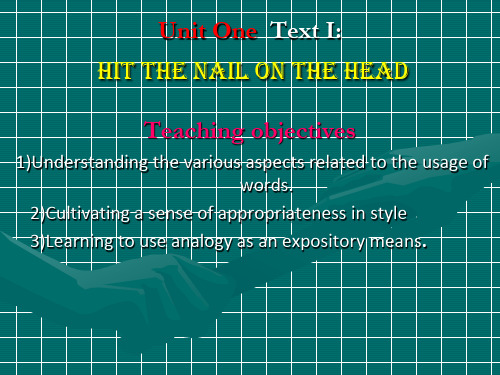
Comprehension of the Text:
Main Idea: To facilitate one’s own process of cognition and one’s communication with others, one must be able to choose the right word from the extensive vocabulary of the English language.
4.What similarities does the author recognize in the job of a carpenter and the work of a writer? 5.How much do you know about style? Do you find it an interesting topic? 6.How do you like the text? Do you find it difficult or easy? Did it take you long to prepare before you come to the class? Are there many new words in the text?
Unit One Text I:
Hit the nail on the Head Teaching objectives
1)Understanding the various aspects related to the usage of words. 2)Cultivating a sense of appropriateness in style 3)Learning to use analogy as an expository means.
高级英语Book5 U1-3
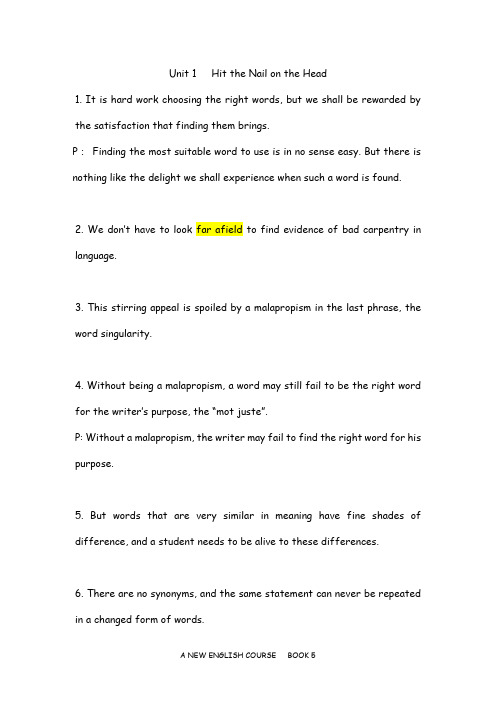
Unit 1 Hit the Nail on the Head1. It is hard work choosing the right words, but we shall be rewarded by the satisfaction that finding them brings.P:Finding the most suitable word to use is in no sense easy. But there is nothing like the delight we shall experience when such a word is found.2. We don’t have to look far afield to find evidence of bad carpentry in language.3. This stirring appeal is spoiled by a malapropism in the last phrase, the word singularity.4. Without being a malapropism, a word may still fail to be the right word for the writer’s purpose, the “mot juste”.P: Without a malapropism, the writer may fail to find the right word for his purpose.5. But words that are very similar in meaning have fine shades of difference, and a student needs to be alive to these differences.6. There are no synonyms, and the same statement can never be repeated in a changed form of words.P: No words have the same meaning and the changing of words even that of the similar meaning will make distinct statements.7. Choosing words is part of the process of realization, of defining our thoughts and feelings for ourselves, as well as for those who hear or read our words.P: Choosing words is part of the process of understanding, of describing our thoughts and feelings not only for those who hear or read our words to understand us, but also for us to understand ourselves.DictationThe foreign student of English may be discouraged and dismayed when he learns that there are over 400,000 words in the English language, without counting slang. But let him take courage. More than half of these words are dead. They are not in current use. Even Shakespeare used a vocabulary of only some 20,000 words. |The average Englishman today probably has a vocabulary range of from 12,000 to 13,000 words. It is good to make your vocabulary as complete as you can, but a great deal can be said and written with a vocabulary of no more than 10,000 words. The important thing is to have a good control and command over the words you do know. Better know two words exactly than three vaguely. A good carpenter is not distinguished by the number of his tools, but by the craftsmanship with which he uses them. So a good writer is not measured by the extent of hisvocabulary, but by his skill in finding the "mot juste", the word that will hit the nail cleanly on the head.Unit 2 Beware the Dirty Seas1. The result is that the Mediterranean, which nurtured so many civilizations, is gravely ill --- the first of the seas to fall victim to the abilities and attitudes that evolved around it.the bad pollution caused by the industry that developed gradually and the ignorance of environmental protection that developed among the people around the seaUnit 3 My Friend, Albert Einstein1. I had to convey the essence of Albert Einstein in a single word, I would choose simplicity.P: Simplicity would be the single word I choose to convey …2. At the age of 16, he asked himself whether a light wave would seem stationary if one ran abreast of it. From that innocent question would arise, ten years later, his theory of relativity.That….led to his theory of …3. His genius burst into fabulous flower.P: His talents brought about unbelievable success suddenly.。
Unit one Hit The Nail On the Head PPT课件
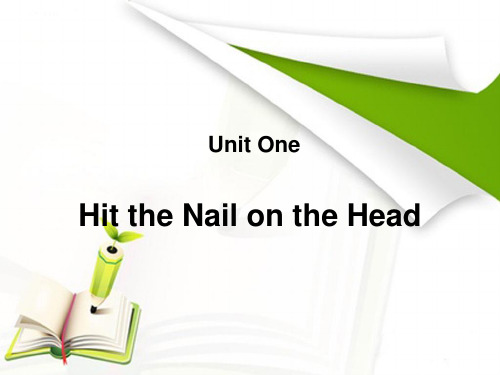
Examples: imprison, contain, sum up, epitomize and distill ④ Stylistic difference between synonyms (Para. 9)
Comparison and analogy
Comparison: A statement or estimate of similarities and differences
Analogy: showing similarities between two things of different classes
Ⅲ Conclusion (para.11)
Ⅱ Body (para.2-10)
①The significance of finding the right words (Para. 2-3) ②Semantic difference between words having the same root
6. scrupulous writers
– writers who are thorough, exact, and who pay careful attention to details 一丝不苟的作家 Unscrupulous 不择手段的,肆无忌惮的
7. shade: (degree or depth of) color 色度 different shades of sth. ---slight differences in sth.
• 他说的真是头头是道。 • Every word he said hit the nail on the head.
unit1 HIT THE NAIL ON THE HEAD
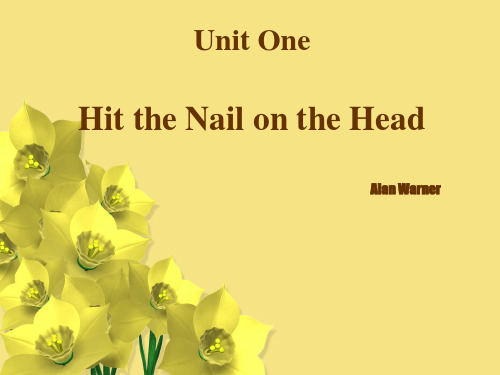
Unit One
Hit the Nail on the Head
Alan Warner
Pre-reading Questions:
1. Have you ever heard of the English proverb “ hit the nail on the head”? What does it mean?
I'm trying to drive home these basic ideas. 我努力把这些基本的思想讲到家。
Le mot juste
Most everyone would attributed this phrase “le mot juste” to Gustava Flaubert. If you go to the web, you will find out there are lots of references to Flauber and le mot juste.
Hit The Nail On The Head
Meaning: exactly right in words or action You really hit the nail on the head when you said that there needs more direct communication between the office staff and the executive management. You analysis really hit the nail on the head. The shower last night hit the nail on the head. The plants were nearly parched. He hit the nail on the head when he mention that the company is actually facing the danger of bankruptcy.
Unit 1 Hit the Nail on the Head
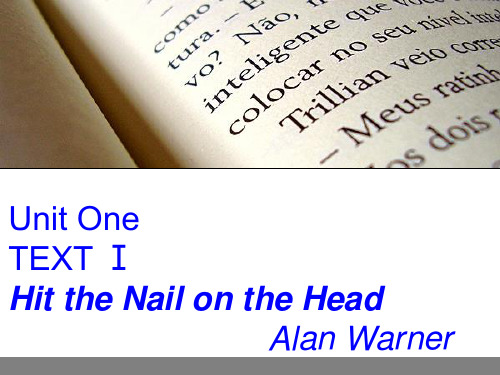
II. Dictionary work 1. drive something home (1.3): force the nail into the
right place; make something unmistakably clear 2. scrupulous(l.10): painstaking; meticulous 3. far afield (l.31): very far away 4. rife (l.38): widespread; common 5. leader(l.45): British English for newspaper editorial 6. coercion (l.48): pressure; compulsion 7. epitomize (l.49): be typical of; serve as the typical
III: library work
1. Gustave Flaubert (l.10):
Born
Died
Occupation
Nationality Genres Literary movement
12 December 180 (aged 58) Rouen, France
• Learn more about English proverbs and idioms:
高级英语Unit 1 Hit the nail on the headPPT精选文档
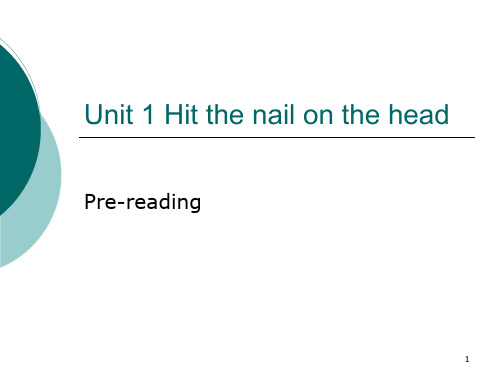
General questions
Main idea: Supporting evidence:
The choice of words: synonyms Reading comprehension (P6 Ex. II) The title means…
3
Structure and topic sentences
8
Para 9 stylistic difference
Gram.: I like reading/ to read. (abstract/concrete action)
Stylistic: formal, informal, literary, archaic, slang/formal. Neutral, informal, eg
domicile (vf, official), residence (f), home (general)
9
Para. 10 and 11
Vocabulary Solution
10
So-and-so
So-and-so: 1.[u]a person or thing that has not been named and is usually one of a group of similar people某某人, 某某事,Mrs. ~ 2.[c]a person who has done sth bad (a word used to express disapproval) 家伙,小子
sentence: A word that is…clean English? Language focus: knock over, drive home-3 Significance
讲课稿-Hit the nail on the head

Hit the nail on the headWhen you first look at the title, what appears in your mind? You may think what the “nail”means here or you may not have a complete understanding of the title. Actually, it is an English proverb, which means to say sth that is exactly right. And in Chinese we say “正中要害,说到点子上” Well, today, we are going to learn a text that is titled “Hit the nail on the head”. Due to time is limited and the text is bit long. Therefore, I am goanna focus on the beginning part of the text and I’ll make a detailed analysis. And because this is General English course, which is a mixture of pronunciation, grammar and vocabulary, as well as writing and translation, please pay attention to the text and what I say.Ok, here we go. I’ll give you three minutes to go through this part quickly and then tell me the main idea of this part:Have you ever watched a clumsy man hammering a nail into a box? He hit it first to one side, then to another, perhaps knocking it over completely, so that in the end he only gets half of it into the wood. A skillful carpenter, on the other hand, will drive home the nail with a few firm, deft blows, hitting it each time squarely on the head. So with language; the good craftsman will choose words that drive home his point firmly and exactly. A word that is more or less right, a loose phrase, an ambiguous expression, a vague adjective, will not satisfy a writer who aims at clean English. He will try always to get the word that is completely right for his purpose.Well, time is up. Anyone who tell me the main idea of this part? (学生回答) Partly right, actually, this part tells us that the choosing of words is just like hitting a nail, we need to choose the exact word when doing writing or translation work. Now, let’s look at this part together: “Have you ever watched a clumsy man hammering a nail into a box?”“你是否曾注意到一个笨手笨脚的人正在往箱子里钉钉子”Here, in this sentence, the word “hammer” is used as a verb, which means to hit sth with a hammer. It can also be regarded as a noun, which refers to a tool with a handle and a heavy metal head, used for breaking things or hitting nails.也就是我们常说的锤子。
Unit1hitthenailonthehead恰到好处
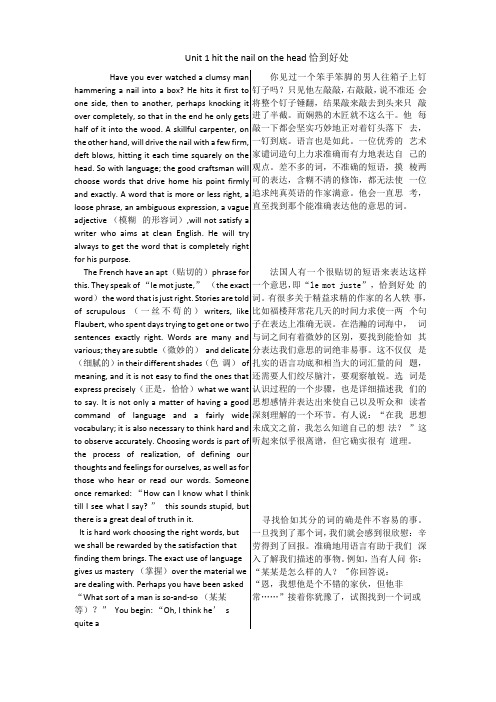
Unit 1 hit the nail on the head 恰到好处Have you ever watched a clumsy man hammering a nail into a box? He hits it first to one side, then to another, perhaps knocking it over completely, so that in the end he only gets half of it into the wood. A skillful carpenter, on the other hand, will drive the nail with a few firm, deft blows, hitting it each time squarely on the head. So with language; the good craftsman will choose words that drive home his point firmly and exactly. A word that is more or less right, a loose phrase, an ambiguous expression, a vague adjective (模糊的形容词),will not satisfy a writer who aims at clean English. He will try always to get the word that is completely right for his purpose.The French have an apt(贴切的)phrase for this. They speak of “le mot juste,” (the exact word) the word that is just right. Stories are told of scrupulous (一丝不苟的)writers, like Flaubert, who spent days trying to get one or two sentences exactly right. Words are many and various; they are subtle (微妙的)and delicate (细腻的)in their different shades(色调)of meaning, and it is not easy to find the ones that express precisely(正是,恰恰)what we want to say. It is not only a matter of having a good command of language and a fairly wide vocabulary; it is also necessary to think hard and to observe accurately. Choosing words is part of the process of realization, of defining our thoughts and feelings for ourselves, as well as for those who hear or read our words. Someone once remarked: “How can I know what I think till I see what I say? ” this sounds stupid, but there is a great deal of truth in it.It is hard work choosing the right words, but we shall be rewarded by the satisfaction that finding them brings. The exact use of language gives us mastery (掌握)over the material we are dealing with. Perhaps you have been asked “What sort of a man is so-and-so (某某等)” You begin: “Oh, I think he’ s quite a你见过一个笨手笨脚的男人往箱子上钉钉子吗?只见他左敲敲,右敲敲,说不准还会将整个钉子锤翻,结果敲来敲去到头来只敲进了半截。
- 1、下载文档前请自行甄别文档内容的完整性,平台不提供额外的编辑、内容补充、找答案等附加服务。
- 2、"仅部分预览"的文档,不可在线预览部分如存在完整性等问题,可反馈申请退款(可完整预览的文档不适用该条件!)。
- 3、如文档侵犯您的权益,请联系客服反馈,我们会尽快为您处理(人工客服工作时间:9:00-18:30)。
高级英语 Unit Hit the Nail on the Head
• III. Library Work
• 1. 1) Gustave Flaubert (1821 – 1880), French novelist, was associated with, though not representative of, the movement of naturalism and known as one of the greatest realists of 19thcentury France. He devoted his life to long hours spent in heavy toil over his work. His writing is marked by exactness and accuracy of observation, extreme impersonality and objectivity of treatment, and precision and expressiveness in style, or the principle of the mot juste.
大家学习辛苦了,还是要坚持
继续保持安 静
• V. Key Points of the Text
• Paragraph 1
• knock over: hit … to fall 捶翻
• drive something home: force (the nail) into the right place; make som子等)打入;使明确无误
• 6. The abundance of specific words in English for general notions (Paragraph 10)
• 7. Conclusion (Paragraph 11): the importance of a good control and command over known words (A good writer is not measured by the extent of his vocabulary, but by his skill in finding the word that will hit the nail cleanly on the head. )
• IV. Organization of the Text
• 1. An analogy between the unskilled use of the hammer and the improper choice of words (Paragraph 1)
• 2. The significance of finding the right words (Paragraphs 2 --- 3)
• (3). Example 3 (singularity vs. singleness) (Paragraphs 6 – 7)
• 4. Wrong choice of words caused by failure to recognize their connotations (Paragraph 8)
• Examples: imprison, contain, sum up, epitomize and distill
• 5. Stylistic differences between synonyms (Paragraph 9)
• Examples: in my childhood vs. when I was a child; love to watch vs. love watching; die vs. expire; poor vs. in indigent circumstances
• 2. Hindi(印地语)is a literary and official language of northern India. Swahili(斯瓦希里语)is a Bantu(班图) language that is a trade and governmental language over much of East Africa and in the Congo region. Bantus are people belonging to a group of tribes found in equatorial and southern Africa.
• 1. 2) Mrs. Malaprop is a famous character
in Sheridan’s comedy The Rivals (1775).
She is noted for her blunders in the use of words. “As headstrong(不受管束的) as an allegory(比方;寓言) (alligator) on
• 3. Semantic differences between words having the same root (Paragraphs 4 --- 7)
• (1). Example 1 (human vs. humane) (Paragraph 4)
• (2). Example 2 (anxiety vs. eagerness) (Paragraph 5)
